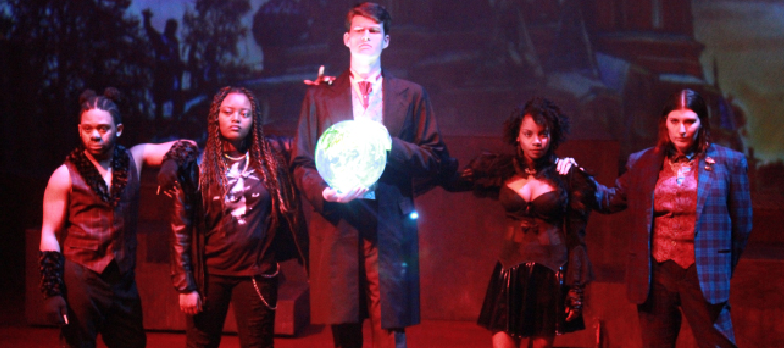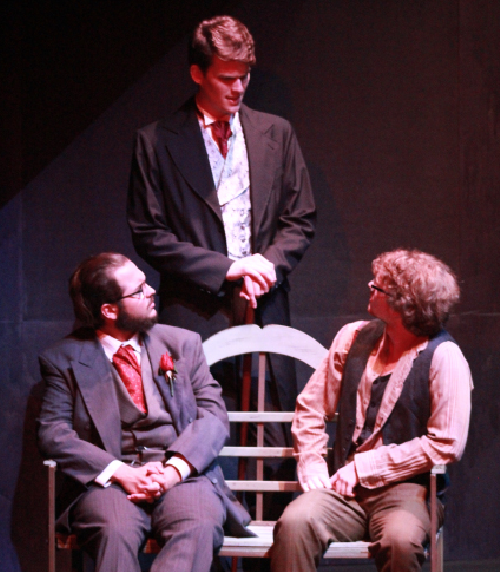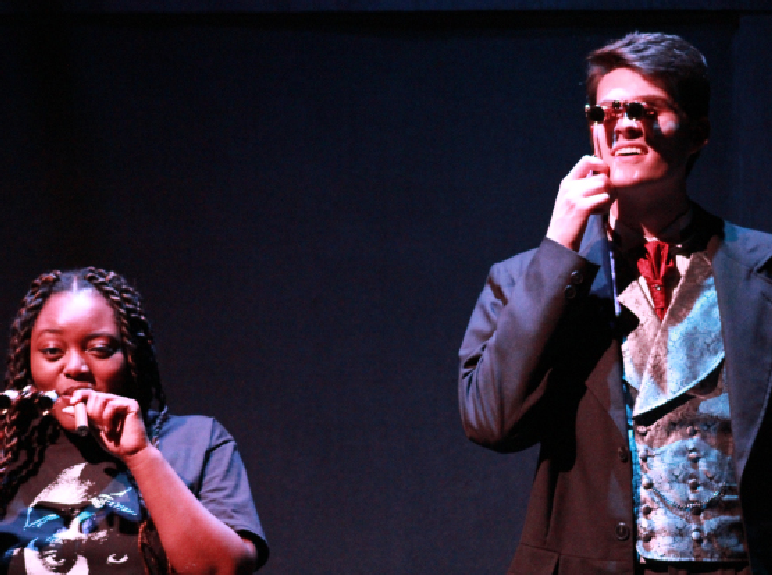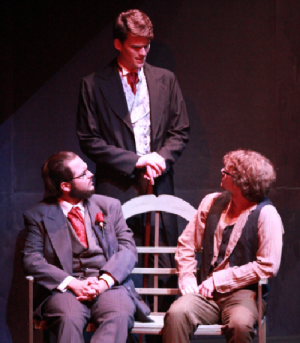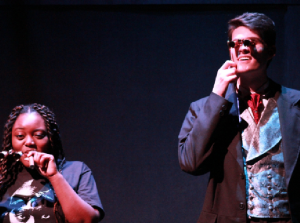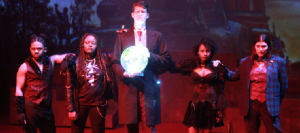Georgia Southern Theatre Department performs Russian play
April 19, 2019
This week and next, the Black Box Theatre will play host to not one time period, but three.
Different worlds are colliding in the Georgia Southern University Theatre Program’s production of “The Master and Margarita.”
The GS theatre program is performing the play based on the novel of the same name by Mikhail Bulgakov, a Russian playwright. “The Master and Margarita” will premiere on Wednesday.
Bulgakov’s novel was not published until years after his death, as it critiqued the Soviet Union and communism, and the play was produced years after that, before the collapse of the Soviet Union.
A Play of Magical Realism
Nicholas Newell, associate professor of theatre, said that “The Master and Margarita” was the last thing Bulgakov wrote before he died, though it was not published until 30 years later.
“Even then, it was immediately banned. It was passed around in handwritten copies from person to person,” Newell said.
The play is being directed by Newell, who described its genre as magic realism, though at the time of the novel’s creation, the genre was not yet popular.
“’The Master and Margarita’ is a very fantastic story about how the devil comes to Moscow and is pleased that everyone is forced to be an atheist in the communist Soviet Union, but is also a bit perturbed that nobody believes in him, so he and his demon minions start creating mischief,” Newell said.
The play takes place not only in Moscow, but also in ancient Jerusalem and a third, magical realm, a sort of limbo that is separate from the other two settings.
“There’s a writer, very much like Bulgakov himself, who has been driven insane and is in a mental asylum, and he was sort of censored into insanity because he wrote something about Pontius Pilate and Jesus, and the officials wouldn’t allow that to happen,” Newell said. “There’s a woman who he was in love with, and who loved him very much, and she will do anything to save him, so she makes a deal with Woland, who’s the devil, basically, to get the Master back.”
The play utilizes a mix of comedy and drama to tell its story, which Newell said works on many different levels.
“You’ve got sort of the comic antics, like one of the demons is a cat who likes guns and drinks vodka. Another one makes people sing,” Newell said. “And then you have sort of this interpretation of what went on during the meeting between Pilate and Jesus. It tends to focus on how much Pilate didn’t want to condemn Jesus, which is what it says in the Bible, but it just sort of explores that further.”
The play is also an example of a story within a story because the Master wrote a manuscript that was eventually going to persevere, just as “The Master and Margarita” itself eventually persevered.
“The story becomes the story of how the book took place, even if there’s no magic, it was the last writings of someone before he died,” Newell said. “So this was his fantasy. This was his escape.”
Bulgakov’s writing created multiple settings in the play, which have presented some unique challenges for the cast and crew.
“Bulgakov was a playwright, but I think when he was writing this novel, it was sort of a way to relieve the frustrations of actually having to physically put something on, and so he created a lot of magical stuff that’s very difficult to stage, like flying, for instance,” Newell said. “And because it’s so vast, because part of it takes place in 1930’s Moscow, and part of it takes place in Jerusalem, and part of it takes place in sort of a magical realm, sort of like limbo, we have to jump around a lot, so it’s not a standard living room set that we just stay in.”
Newell said that he was most excited about the ways the cast of more than 20 people, as well as everyone else involved with the production, has been working together to bring the play to life.
“It’s just nice seeing everybody start to explore all the ways that they can make it better,” Newell said. “A lot of people have a lot of interesting ideas about how to bring this to life, and some of it we can use, and some of it we can’t, but it’s nice when your cast is sort of part of the collaborative process.”
Bringing the characters to life
The cast of “The Master and Margarita” is made up of more than twenty people, with some principle roles and many ensemble roles. The George-Anne asked some of the principle cast members about their roles in the play.
Nicholas Parrish, a sophomore theatre major, plays Ivan Nikolayevich. Parrish said he felt somewhat close to the character and gets to bring in his own experiences when acting.
“I feel like Ivan is the most relatable character in the play because the way he reacts in the events he experiences throughout the play is the same way most people would probably react to the given situations,” Parrish said in an email. “I feel like Ivan is a person who is quite disappointed with where he currently is in life and feels he could be doing better with his life.”
Parrish said that he is most excited to get to see everything come together and how a live audience will react to the show.
“We have all been giving our best and care about this show deeply. This show means so much to our director and I’m excited to be part of such a passion project,” Parrish said.
Cat Wyatt, a junior theatre and psychology major, plays Margarita Nikolyevna. Wyatt said Margarita is the hardest character she has had to play during her time at GS.
“It’s hard to understand her without living the life she lived,” Wyatt said in an email. “She is very desperate to save her love, and goes to extreme lengths to do so. It’s been fun playing a character who is willing to just do pretty much anything if it gets her what she wants.”
Christopher Lyles, a junior theatre major, plays The Master.
“Playing this character entails a lot. The Master is very emotional, but in his own way. And he still has to remain in control of everything that’s going on, which is not easy,” Lyles said in an email. “I am most excited about seeing everybody’s reaction and performing with everyone. Whenever we put on a show everybody usually enjoys it and we have a lot of fun.”
Michael Houston, a senior multimedia film and production major, plays Pontius Pilate. Houston said that he enjoyed exploring Pilate’s thoughts and emotions throughout the story.
“I always wondered how any man would react in Pilate’s place, when faced with that same case. What did he feel, then, when faced with an innocent man that was being condemned for seemingly no reason?” Houston said in an email. “That is the centerpiece of The Master’s play, exploring the emotional battle Pilate fought with himself in condemning Jesus of Nazareth to death, and to be able to explore Pilate’s guilt, sorrow and pursuit of redemption has been an incredible journey.”
Houston also plays Latunsky, a Soviet critic.
“Latunsky has been a ton of fun to play. He’s the stereotypical face of the early Soviet government, and playing around with that comedically is such a joy,” Houston said. “I won’t go too much into what goes on with Latunsky as the play unfolds, but I will say things get hog wild with him. It’s been a blast.”
Julien Mendes, a sophomore theatre major, plays Yeshua. Mendes said that he is trying bring a more human side to the character.
“I believe Yeshua does not see himself as the son of God, but he sees the good in people and wants everyone to follow him and open their eyes to the truth,” Mendes said in an email.
Mendes also plays Baron Meigel, a member of the KGB.
Andrew Shepherd, a senior theatre major, plays Woland, the Devil. Shepherd said he is trying to bring a sense of class and sophistication to the character while keeping his evil nature.
“I looked toward the sadistic and cold Hannibal Lecter in Silence of the Lambs for the evil part and then decided that David Bowie was the best inspiration for the style part,” Shepherd said in an email. “He’s also an extremely snarky and sarcastic devil, and I just used my own sense of humor for those parts.”
Shepherd said he is most excited to see the audience’s reaction to the show, given its many layers and plotlines.
“I’m most excited about how the audience will react to the layers of the show,” Shepard said. “This is a play with like three different plotlines that all come together, and I think it’ll be great to see how people react to that.”
Master and Margarita will run from Wednesday to April 24. There will not be performances on April 21 or 22. Ticket information can be found on the College of Art and Theatre’s website.
Rachel Adams, The George-Anne Enterprise Reporter, gaeditor@georgiasouthern.edu.



